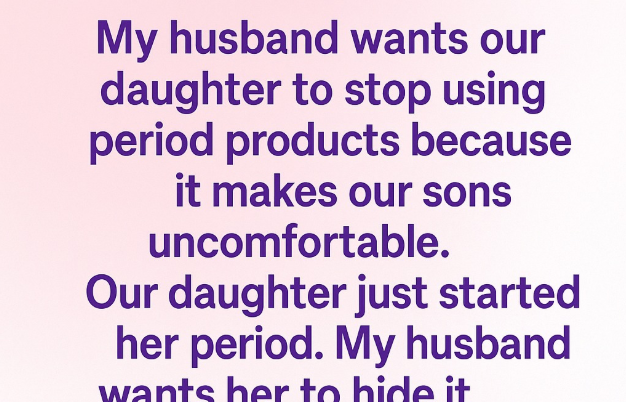My husband wanted our daughter to stop using period products because he said it made our sons uncomfortable.
Our daughter had only recently started her period, and she was still adjusting to this new part of her life. My husband told her to keep everything hidden so that our teenage sons wouldn’t feel uneasy. They had seen a used pad in the trash and reacted with shock, avoiding her whenever she was menstruating.
The moment that broke me was when my husband suggested she stay in her room “until it’s over,” so the boys wouldn’t have to deal with it. I saw the light fade from her face. She was already trying to understand her changing body, and now she was being made to feel like she had done something wrong. That night, she cried alone in her room—not because of physical pain, but because of shame. Shame for something completely natural.
I knew I couldn’t let that continue. The next morning, I called everyone into the living room for a family meeting. I sat our sons down and explained that their sister’s experience wasn’t something gross or uncomfortable—it was simply a normal part of growing up for many people. I told them that discomfort often means there’s something we need to learn, not something we need to avoid. I spoke calmly but firmly about empathy, understanding, and respect.
My husband sat in silence, listening. A few moments later, our daughter hesitantly entered the room. I smiled at her and asked her to sit with us—not as someone who needed to hide, but as someone who deserved to be seen and supported.
Slowly, the boys began to open up. They admitted they didn’t understand much about periods and weren’t sure how to react. I answered their questions with patience, helping them see that knowledge replaces fear. By the end of the conversation, one of them asked if there was anything they could do to make their sister feel more comfortable at home when she wasn’t feeling well. My daughter’s face softened—she looked relieved, accepted, and no longer alone.
Later that evening, my husband came to me. He admitted that when he was growing up, no one ever talked about these things. He said he simply didn’t know how to handle it. Then, he went to our daughter’s room, sat beside her, and apologized for making her feel isolated. He promised to do better.
That weekend, he surprised her with her favorite ice cream and told her, “You never have to hide anything here. This is your home too.” It didn’t erase everything that happened, but it was a start.
And in that small, quiet moment, I realized we were finally becoming a family that chose compassion over silence—and understanding over shame.







